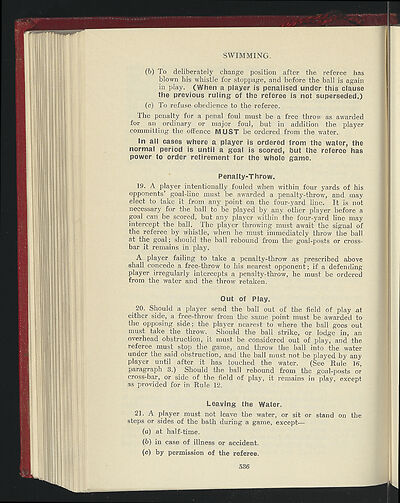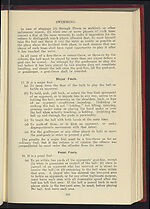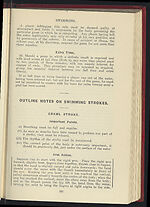1936-37
(560)
Download files
Complete book:
Individual page:
Thumbnail gallery: Grid view | List view

SWIMMING.
(b) To deliberately change position after the referee has
blown his whistle for stoppage, and before the ball is again
in play.
(When a player is penalised under this clause
the previous ruling of the referee is not superseded.)
(c) To refuse obedience to the referee.
The penalty for a penal foul must be a free throw as awarded
for an ordinary or major foul, but in addition the player
committing the offence
MUST
be ordered from the water.
In all cases where a player is ordered from the water, the
normal period is until a goal is scored, but the referee has
power to order retirement for the whole game.
Penalty-Throw.
19. A player intentionally fouled when within four yards of his
opponents' goal-line must be awarded a penalty-throw, and may
elect to take it from any point on the four-yard line. It is not
necessary for the ball to be played by any other player before a
goal can be scored, but any player within the four-yard line may
intercept the ball. The player throwing must await the signal of
the referee by whistle, when he must immediately throw the ball
at the goal; should the ball rebound from the goal-posts or cross-
bar it remains in play.
A player failing to take a penalty-throw as prescribed above
shall concede a free-throw to his nearest opponent; if a defending
player irregularly intercepts a penalty-throw, he must be ordered
from the water and the throw retaken.
Out of Play.
20. Should a player send the ball out of the field of play at
either side, a free-throw from the same point must be awarded to
the opposing side; the player nearest to where the ball goes out
must take the throw. Should the ball strike, or lodge in, an
overhead obstruction, it must be considered out of play, and the
referee must stop the game, and throw the ball into the water
under the said obstruction, and the ball must not be played by any
player until after it has touched the water. (See Rule 16,
paragraph 3.) Should the ball rebound from the goal-posts or
cross-bar, or side of the field of play, it remains in play, except
as provided for in Rule 12.
Leaving the Water.
21. A player must not leave the water, or sit or stand on the
steps or sides of the bath during a game, except—
(a) at half-time.
(b) in case of illness or accident.
(c)
by
permission of the referee.
i
536
(b) To deliberately change position after the referee has
blown his whistle for stoppage, and before the ball is again
in play.
(When a player is penalised under this clause
the previous ruling of the referee is not superseded.)
(c) To refuse obedience to the referee.
The penalty for a penal foul must be a free throw as awarded
for an ordinary or major foul, but in addition the player
committing the offence
MUST
be ordered from the water.
In all cases where a player is ordered from the water, the
normal period is until a goal is scored, but the referee has
power to order retirement for the whole game.
Penalty-Throw.
19. A player intentionally fouled when within four yards of his
opponents' goal-line must be awarded a penalty-throw, and may
elect to take it from any point on the four-yard line. It is not
necessary for the ball to be played by any other player before a
goal can be scored, but any player within the four-yard line may
intercept the ball. The player throwing must await the signal of
the referee by whistle, when he must immediately throw the ball
at the goal; should the ball rebound from the goal-posts or cross-
bar it remains in play.
A player failing to take a penalty-throw as prescribed above
shall concede a free-throw to his nearest opponent; if a defending
player irregularly intercepts a penalty-throw, he must be ordered
from the water and the throw retaken.
Out of Play.
20. Should a player send the ball out of the field of play at
either side, a free-throw from the same point must be awarded to
the opposing side; the player nearest to where the ball goes out
must take the throw. Should the ball strike, or lodge in, an
overhead obstruction, it must be considered out of play, and the
referee must stop the game, and throw the ball into the water
under the said obstruction, and the ball must not be played by any
player until after it has touched the water. (See Rule 16,
paragraph 3.) Should the ball rebound from the goal-posts or
cross-bar, or side of the field of play, it remains in play, except
as provided for in Rule 12.
Leaving the Water.
21. A player must not leave the water, or sit or stand on the
steps or sides of the bath during a game, except—
(a) at half-time.
(b) in case of illness or accident.
(c)
by
permission of the referee.
i
536
Set display mode to:
![]() Universal Viewer |
Universal Viewer | ![]() Mirador |
Large image | Transcription
Mirador |
Large image | Transcription
| Games and sports in the army > 1936-37 > (560) |
|---|
| Permanent URL | https://digital.nls.uk/248725218 |
|---|
| Description | 'Games and Sports in the Army' was an annual publication produced by the British War Office between the 1930s and 1960s. This included the Second World War. It outlines the rules and regulations for games and sports played by members of the armed forces. It features names and photographs of team members, and examples of contemporary advertising. |
|---|---|
| Shelfmark | GWB.52 |

